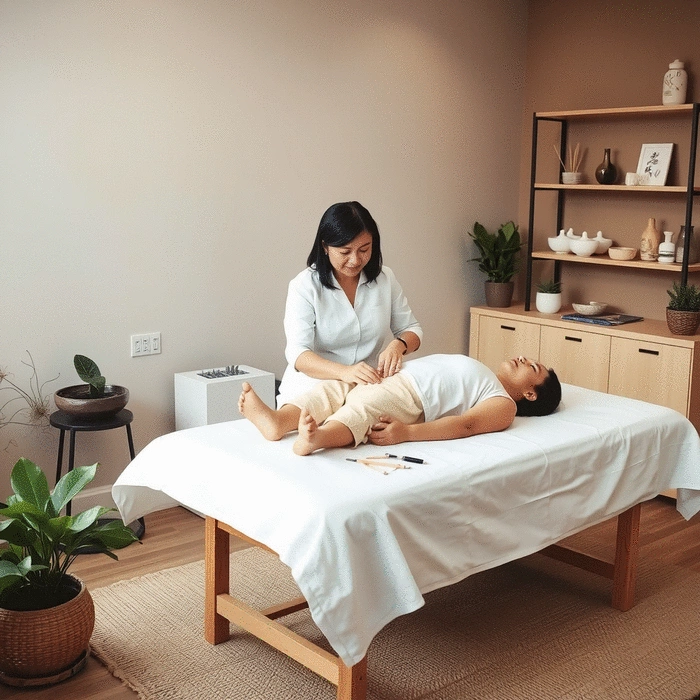Acupuncturists’ Approach to Patient Care

Posted on: 2025-08-11
By: Kaiya Whitmore
Acupuncture, often perceived as merely a practice of needle insertion, embodies a holistic approach to patient care that transcends traditional boundaries. Through fostering patient-centered communication, acupuncturists can enhance treatment effectiveness and empower individuals on their health journeys. As we delve into the core principles of this ancient practice, consider how personalization and empathy redefine your experience with wellness.
What You Will Learn
- Holistic Healing: Acupuncture integrates both ancient techniques and modern insights, focusing on the whole person rather than just symptoms.
- Patient-Centered Care: Emphasizes the importance of understanding individual patient stories and tailoring treatment plans to their unique health journeys.
- Core Principles of Communication: Active listening, empathy, and collaboration are essential for building trust and enhancing patient engagement.
- Preparation for Treatment: Arriving with an open mind and sharing health history can significantly improve the therapeutic relationship and treatment outcomes.
- Telehealth Integration: Telehealth expands access to acupuncture consultations, making holistic care more accessible for those in remote areas or with transportation challenges.
Core Principles of Patient-Centered Communication in Acupuncture
These core principles guide the practice of acupuncture, enhancing patient engagement and therapeutic relationships. For more insights into how acupuncture benefits overall well-being, explore our article on insights on acupuncture benefits.
Active Listening
Truly hearing a patient's concerns helps build trust.
Empathy
Understanding patients' experiences fosters a supportive environment.
Collaboration
Working together in decision-making enhances patient engagement.
Clarity
Explaining treatment processes in straightforward terms helps demystify acupuncture.
Understanding Acupuncture: A Holistic Approach to Patient Care
Acupuncture is a fascinating practice that goes beyond just needle insertion; it's a holistic approach to patient care. Many people view it through the lens of ancient tradition, but it has evolved to meet the needs of modern wellness. At Acupuncture Perspectives, we believe that understanding acupuncture as part of a broader system of healing can significantly enhance patient outcomes.
Patient-centered care is key in acupuncture. It emphasizes the importance of treating individuals, not just their symptoms. When I engage with clients, I focus on their unique stories and challenges to tailor our sessions to their individual health journeys. This approach ensures that every patient feels heard and valued, promoting a deeper connection and understanding.
Defining Acupuncture Within Patient-Centered Care
So, what exactly is acupuncture? In simple terms, it involves inserting thin needles into specific points on the body to promote balance and healing. This practice is rooted in Traditional Chinese Medicine (TCM) and is designed to enhance the body's natural ability to heal. By creating a personalized treatment plan, we can address various health concerns, from chronic pain to stress management! To learn more about how acupuncture plays a role in various medical contexts, consider reading about acupuncture's role in Western medicine.
Here are some core principles that exemplify patient-centered communication in acupuncture:
- Active Listening: Truly hearing a patient's concerns helps build trust.
- Empathy: Understanding patients' experiences fosters a supportive environment.
- Collaboration: Working together in decision-making enhances patient engagement.
What is Acupuncture and Its Role in Patient Care?
Acupuncture serves as a bridge between ancient healing practices and contemporary health needs. It's not just about the needles; it's about creating a space where patients feel safe and understood. At Acupuncture Perspectives, I take pride in guiding patients through their health journeys, utilizing acupuncture to alleviate symptoms and promote overall wellness.
By considering each patient's medical history, lifestyle, and personal preferences, we craft a treatment plan that resonates with them. This individualized approach is vital to achieving optimal results. My goal is to empower patients to take charge of their health while exploring the transformative potential of acupuncture.
Core Principles of Patient-Centered Communication in Acupuncture
Effective communication is essential in building therapeutic relationships in acupuncture. Here are a few principles that guide my practice:
- Clarity: Explaining treatment processes in straightforward terms helps demystify acupuncture.
- Respect: Acknowledging patients' beliefs and preferences creates a respectful environment.
- Feedback: Encouraging patients to share their thoughts helps refine treatment plans.
By adhering to these principles, I aim to foster trust and collaboration, ensuring that each acupuncture session is as effective and meaningful as possible. Understanding the holistic nature of acupuncture allows us to work together toward improved health and well-being! For more on the global impact and practices within acupuncture, you might find our article on global acupuncture practices explored insightful.
Pro Tip
When preparing for your acupuncture appointment, consider keeping a health journal. Documenting your symptoms, lifestyle, and emotional state can provide valuable insights for your acupuncturist. This information not only aids in crafting a personalized treatment plan but also helps you track your progress over time, enhancing the overall effectiveness of your care.
Summarizing the Comprehensive Approach of Acupuncturists
As an acupuncturist at Acupuncture Perspectives, I firmly believe in the power of a comprehensive approach to patient care. This approach emphasizes the importance of understanding not just the symptoms, but the whole person. By integrating traditional techniques with modern insights, we can foster an environment that promotes healing and well-being.
In our practice, we prioritize patient-centered care. This means actively listening to our patients, understanding their unique needs, and tailoring treatment plans accordingly. From the moment a patient walks through our doors, they are not just a case; they are an individual with their own story and journey. This perspective significantly enhances the therapeutic relationship.
Key Takeaways on Patient-Centered Care in Acupuncture
Understanding the essence of patient-centered care can truly transform the acupuncture experience. Here are some key takeaways that highlight what sets this approach apart:
- Empathy is a core element, allowing acupuncturists to connect deeply with patients.
- Evidence-based practices ensure that treatments are rooted in scientific principles, enhancing credibility and effectiveness.
- Communication is vital; actively listening fosters trust and openness, encouraging patients to share their concerns.
- Holistic assessments consider not only physical symptoms but also emotional and lifestyle factors that contribute to health.
By weaving these elements into our practice, we create a tapestry of care that respects individual differences while promoting healing. Each patient's experience is unique, and that’s the beauty of acupuncture—it adapts and evolves based on their needs!
Highlighting the Integration of Empathy and Evidence-Based Practices
Incorporating empathy and evidence-based practices is essential for achieving optimal outcomes in acupuncture. Empathy allows us to understand the emotional and psychological aspects of a patient’s condition. When combined with evidence-based treatments, we can develop a more effective and comprehensive care plan that addresses both the mind and body.
At Acupuncture Perspectives, we encourage open dialogue and shared decision-making. This not only empowers patients but also helps us to refine our strategies. Patients feel more engaged and are more likely to adhere to treatment plans when they feel their voices are heard.
- Active listening helps to identify underlying issues.
- Evidence-based practices strengthen the credibility of treatment plans.
- Empathy fosters a supportive environment for healing.
By continuously blending these aspects, we ensure that our patients receive the highest standard of care possible, tailored just for them! It’s this integrated approach that truly makes a difference.
Frequently Asked Questions (FAQs)
- What is patient-centered care in acupuncture?
- Patient-centered care in acupuncture emphasizes treating the individual as a whole, focusing on their unique story, needs, and preferences rather than just their symptoms. It involves active listening, empathy, and collaboration to create personalized treatment plans.
- How does communication impact acupuncture treatment?
- Effective communication, including active listening, empathy, clarity, respect, and feedback, builds trust and a strong therapeutic relationship. This helps the acupuncturist understand the patient's concerns deeply and allows for more tailored and effective treatment plans.
- What should I do to prepare for my first acupuncture appointment?
- To prepare, arrive with an open mind, share your complete health history (including existing conditions and medications), set clear goals for what you hope to achieve, and don't hesitate to ask questions about the process or techniques. Keeping a health journal can also be beneficial.
- Can telehealth be used for acupuncture?
- Yes, telehealth is increasingly used for acupuncture consultations and follow-ups. It provides convenient access, allows for discussion of treatment plans, addresses concerns, and can even guide self-care techniques, making care more accessible, especially for those in remote areas or with transportation challenges.
- Why is a holistic approach important in acupuncture?
- A holistic approach in acupuncture means considering all aspects of a patient's health—physical, emotional, and lifestyle—rather than just isolated symptoms. This comprehensive view helps identify underlying issues and create a more integrated and effective treatment plan for overall well-being.
Encouraging Patient Engagement and Next Steps
As we conclude this exploration of patient-centered care in acupuncture, I want to emphasize the importance of patient engagement. Your involvement in the treatment process is vital for achieving the best outcomes. So, how can you prepare for your first acupuncture appointment and make the most of your experience?
How to Prepare for Your First Acupuncture Appointment
Preparing for your first session can be an exciting yet nerve-wracking experience. Here are some tips to help you get ready:
- Arrive with an open mind: Be ready to embrace the process and learn about your unique treatment plan.
- Share your health history: Discuss any existing conditions or medications with your acupuncturist.
- Set goals: Think about what you hope to achieve through acupuncture—relief from pain, improved sleep, or stress reduction.
- Ask questions: Don’t hesitate to inquire about the techniques, needles, and what to expect during treatment.
Taking these steps can enhance your experience and help establish a strong therapeutic relationship. It’s all about laying a solid foundation for your healing journey! For more detailed insights into specific conditions, you might find articles like acupuncture insights for chronic conditions helpful.
Inviting Patient Testimonials: Sharing Your Acupuncture Journey
At Acupuncture Perspectives, we love hearing from our patients about their experiences. Sharing your acupuncture journey can inspire others to explore this ancient healing method. Whether it’s a story of relief from chronic pain or a newfound sense of calm, your insights can help demystify acupuncture for newcomers.
If you have had a positive experience, we encourage you to share your testimonial! Not only does this create a sense of community, but it also helps fellow patients feel more at ease as they embark on their own healing journeys.
Understanding the Role of Telehealth in Acupuncture
In today’s world, telehealth has become an invaluable tool, especially in holistic healthcare. It allows for convenient access to acupuncture consultations and follow-ups, making it easier for patients to engage with their care. Through virtual appointments, we can discuss treatment plans, address concerns, and even guide patients on self-care techniques.
Telehealth also offers flexibility for individuals who may have difficulty attending in-person sessions. It can be especially beneficial for those living in remote areas or dealing with transportation issues. By embracing technology, we extend our commitment to making acupuncture accessible to everyone! You can also explore how acupuncture is viewed globally in our article on global perspectives on acupuncture.
Recap of Key Points
Here is a quick recap of the important points discussed in the article:
- Holistic Approach: Acupuncture is more than needle insertion; it’s a comprehensive method that considers the whole person.
- Patient-Centered Care: Emphasizing individual stories and tailoring treatment plans promotes deeper connections and better outcomes.
- Core Communication Principles: Active listening, empathy, clarity, respect, and feedback are essential for effective therapeutic relationships.
- Integrating Evidence-Based Practices: Combining empathy with scientific principles enhances treatment credibility and effectiveness.
- Preparation for Appointments: Arriving with an open mind, sharing health history, and setting goals can significantly enhance the acupuncture experience.
- Telehealth Accessibility: Utilizing telehealth for consultations and follow-ups makes acupuncture more accessible to a wider audience.
 When was the last time you felt empowered to take control of your health? Community acupuncture init
When was the last time you felt empowered to take control of your health? Community acupuncture init
 As the global fascination with ancient healing practices like acupuncture grows, understanding its d
As the global fascination with ancient healing practices like acupuncture grows, understanding its d
 Acupuncture's journey from ancient practice to modern healthcare staple is a fascinating tale of evo
Acupuncture's journey from ancient practice to modern healthcare staple is a fascinating tale of evo